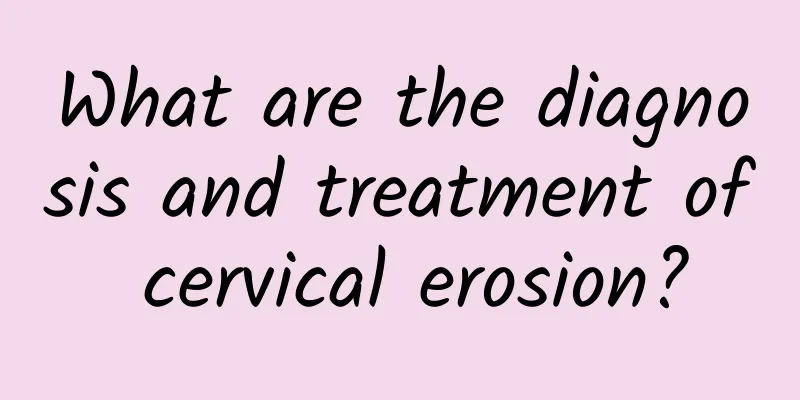What are the diagnosis and treatment of cervical erosion?

|
Cervical erosion is a disease that everyone is familiar with. Cervical erosion is common in many people. Understanding the causes of cervical erosion can help everyone take relevant preventive measures. In life, we should also pay attention to giving good care to patients with cervical erosion. The diagnosis of cervical erosion is very important. Here we will introduce the diagnosis and treatment of cervical erosion. Diagnosis of cervical erosion 1. Gynecological examination. Focus on checking the size, shape, texture, thickness of the cervix, and whether there is contact bleeding. Then check the condition of the vulva, vagina, uterus, and paracervical tissues (ovaries, fallopian tubes, pelvic lymph nodes, etc.). 2. Cervical smear cytology examination is a routine gynecological examination. It is simple, easy, cost-effective, and the most important auxiliary examination and the preferred initial screening method for cancer prevention surveys. 3. Colposcopy can quickly detect lesions that are invisible to the naked eye. Taking biopsies from suspicious areas during colposcopy can significantly improve the accuracy of biopsies. 4. Iodine test and naked eye observation are very simple and cheap, and can detect at least 2/3 of the lesions. Currently, the World Health Organization (WHO) recommends the use of naked eye observation in developing countries. As a preliminary screening method for cervical cancer, acetic acid solution is applied to the cervix. The reaction of the cervical epithelium to acetic acid is observed, and then a biopsy is taken from the white lesion area. 5. Pathological examination of cervical biopsy tissue is the basis for confirming cervical cancer. Treatment of cervical erosion Common treatments for cervical erosion include: (1) Drug treatment: For those with small erosions and shallow inflammatory infiltration, the following drug treatment methods can be used: ① 10-205 silver nitrate: Apply topically once a week, 2-4 times as a course of treatment. ② Potassium permanganate: Apply topically after menstruation, and repeat the application once after 1-2 months. When using the above drugs, be careful to prevent burns to the surrounding vaginal wall, and pay attention to disinfection when using the drugs to prevent repeated infections. (2) Physical therapy: used for cervical erosion with a large erosion area and deep inflammatory infiltration. ① Electric ironing: Use a special electric iron to burn the eroded surface tissue, causing it to necrotize and fall off, and the ironing must reach a certain depth, so that the treatment effect is good. ② Cryotherapy: Use a special rapid freezing device to freeze, necrotize, and fall off the lesion tissue on the cervical erosion surface. The commonly used cryogen is liquid nitrogen, which can reduce the temperature of the freezing head of the freezer to -196℃. It is placed on the surface of the cervix to freeze the eroded tissue to necrotize and fall off, and then new epithelial tissue will grow again. It can be cured in one time. Generally, there are no adverse reactions. A few patients have mild dizziness and lower abdominal pain. ③ Laser treatment: Carbon dioxide laser therapy device is often used. A special laser treatment head is used to irradiate the cervical erosion tissue, causing the erosion tissue to carbonize, scab, and fall off, and then new squamous epithelium will grow again. Generally, it can be cured in one session. There is no special discomfort during the operation, and a few patients may bleed when the scab falls off. ④KS instrument treatment: It uses special band light and heat treatment, which is painless and effective. During the treatment with the above method, attention should be paid to the cleanliness of the vulva, and sexual intercourse, vaginal irrigation and sitting bath are prohibited. Regular check-ups should also be conducted to observe the healing of the erosion surface. (3) Surgical treatment: For patients who are ineffective with medication and physical therapy, have deep or large cervical erosion, have cervical hypertrophy, or are suspected of having cancer, cervical cone resection or total hysterectomy may be considered. |
<<: What are the diagnosis and treatment methods for cervical erosion?
>>: Which is better, medical abortion or not?
Recommend
The occurrence of cervical erosion has many hazards for female patients
There are many gynecological inflammations, cervi...
What happens if there is suddenly blood in the leucorrhea like menstruation?
If there is suddenly blood in the leucorrhea and ...
Ectopic pregnancy remedies
Ectopic pregnancy refers to an abnormal pregnancy...
What medicine is good for irregular menstruation
What medicine should I take for irregular menstru...
What are the best ways to prevent menopause?
Postmenopausal women sometimes experience vaginal...
5 ingredients for beautiful breasts! Eat green papaya to make it round and chewy
In the hot summer, the topic of women's beaut...
The secret to avoiding the crisis of weight gain for office workers: stay away from these 5 snacks
In modern society, office workers often face many...
How to take care of your body after an abortion? Experts recommend 3 abortion care and 6 measures
After the abortion, you need to get enough rest a...
How to treat polycystic ovary syndrome quickly
The severity of PCOS varies, so if you want to ac...
What should I do if I am pregnant and I am diagnosed with uterine fibroids?
Uterine bleeding is the main symptom of uterine f...
The dangers of bacterial vaginosis that female friends need to pay attention to
Bacterial vaginitis is a gynecological disease th...
What is vaginal bleeding after sex? Is vaginal bleeding after sex caused by cervicitis?
In clinic, some patients often say that they foun...
Prevention of hyperprolactinemia induced by risperidone
Hyperprolactinemia is the most common pituitary d...
Experts briefly introduce the common stages of dysmenorrhea
There are many stages of dysmenorrhea in clinical...
Can cervical precancerous lesions be cured?
Cervical cancer is divided into early, middle and...









